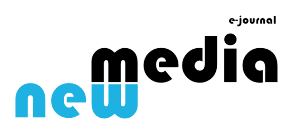MEDIA DISCOURSE, IDEOLOGY AND PRINT MEDIA IN TURKEY
Begüm BAYRAK
ABSTRACT
This article addresses power, ideology and media context generally. .In democratic countries, the free media is regarded as the “fourth estate” besides the legislative, executive and judiciary branches. It can be said that political power has a significant role in shaping media discourse. The newspapers as the most efficient print media elements have an effective role in media discourse. Besides determining political agenda, the newspapers function as the instrument of hegemony of the political authority. The objective of this article is two-fold. The first is to analyze the role of the media discourse in the (re)production of ideologies. Within this framework, the role of the media in democratic countries will also be under scrutiny. Second,a historical overview of Turkish print media in general and the Hürriyet newspaper in particular will be provided. Bourdieu argues that, the power of the words lies not in their intrinsic qualities but in the belief that they are uttered by authorized spokespersons (Bourdieu, 1991: p.170). In this context, one of the main arguments of this article is that the Hurriyet newspaper as one of the leading voices of the mainstream media is efficient in determining the political and social agenda. The qualitative research method is used in the article.
Keywords: Ideology, power, media, media discourse, print media in Turkey
MEDYA SÖYLEMİ, İDEOLOJİ VE TÜRKİYE’DE YAZILI BASIN
ÖZ
Bu makale genel olarak güç, ideoloji ve medya söylemini irdelemektedir. Demokratik ülkelerde özgür medya yasama, yürütme ve yargı erkinin yanında “dördüncü kuvvet” olarak görülmektedir. Siyasal gücün medya söylemini şekillendirmede önemli bir rolü olduğu söylenebilir. En etkili yazılı medya unsurlarından olan gazeteler medya söyleminde önemli bir role sahiptirler. Siyasal gündemi belirlemeye ek olarak gazeteler siyasal iktidarın hegemonya aracı olarak da işlev görmektedirler. Bu makalenin çift yönlü bir amacı bulunmaktadır. Birincisi, ideolojilerin söylemsel olarak üretilmesinde medya diskurunun rolüne ışık tutmaktır. Bu çerçeve içinde, demokratik ülkelerde medyanın rolü analiz edilecektir. İkinci olarak genelde Türk yazılı basını, özelde ise Hürriyet gazetesi tarihi bir özet ile analiz edilecektir. Bourdieu’a gore (1991, p. 170), kelimelerin gücü onların içkin özelliklerinde değil onların yetkin sözcüler tarafından ifade edilmesindedir. Bu bağlamda Hürriyet gazetesinin anaakım medyanın başat seslerinden biri olarak siyasal ve sosyal gündemi belirlemede etkili olduğu makalenin temel iddialarından biridir. Makalede nitel araştırma yöntemi kullanılmıştır.
Anahtar Kelimeler: İdeoloji, güç, medya, söylem, medya söylemi, Türkiye’de yazılı medya
TAM METİN
KAYNAKLAR
Althusser, L. (1971). Ideology and Ideological State Apparatuses.New York: Monthly Review Press.
Bourdieu, P. (1991). Language and Symbolic Power. Cambridge, Mass.: Harvard University Press
Burak, B. (2010). Türkiye’nin Siyasal ve Yönetsel Yaşamında 28 Şubat Süreci’nin Yeri Üzerine Bir İnceleme (Master Dissertation, Istanbul University).
Duran, R. (2003). Türk Medyası Neden Savaş Yanlısı. Savaş ve Medya. Eskişehir: ILAD.
Eagleton, T. (1991). Ideology: An Introduction. London: Verso.
Efe, İ. (2012). Critical Discourse Analysis of Kemalism and Islamism in Turkish Newspapers: The 2008 Indictment Case the 28 February National Security Council Meeting (Doctoral Dissertation, Lancaster University).
Fairclough, N. L. Wodak .R. (1997). Critical discourse analysis. In, Teun A. V. D.Discourse Studies. A Multidisciplinary Introduction. Vol. 2. Discourse as Social Interaction. London: Sage. 258-284
Fontana, B. (2005). The Democratic Philosopher: Rhetoric as Hegemony in Gramsci, .ItalianCulture.Vol: 23. No: 1. . 97-123.
Foucault, M. (1979). Disciplin eand Punish: the Birth of the Prison. Harmondsworth: Penguin
Foucault, M. (1984). The Order of Discourse. İn Shapiro, M. Language and Politics. London: Blackwell. 108-138.
Gaventa, J. (2003). Power After Lukes: A Review Of TheLiterature. Brighton: Institute of Development Studies
Hoare, Q.,Geoffrey, N.S. (1971). Selections from the prison notebooks of Antonio Gramsci.New York: International Publishers.
Gurevitch, M.,Levy, M. R. (1985). Mass Communication Review Yearbook. Sage Publications Inc.
Habermas, J. (1989). The Structural Transformation of the Public Sphere. Cambridge:PolityPress.
Herman, E. S. and Chomsky, N. (1988). Manufacturing Consent: ThePoliticalEconomy of the Mass Media. New York: PantheonBooks.
Holmes, S. (1991). Liberal constraints on private power? in Lichtenberg, J. Democracy and theMass Media. Cambridge: Cambridge UniversityPress. 21-65.
Kaya, R. Çakmur, B. (2010). Politics and the mass media in Turkey. Turkish Studies. Vol: 11. No:4. 521-537.
Keane, J. (1991). The Media and Democracy. Cambridge: PolityPress
Lasswell, Harold D. (1948). “The structure and function of communication in society”. in Bryson, L. (ed.). The Communication of Ideas. New York: Harper & Co. Pp. 37-51
Montgomery, M. (1995). An İntroduction To Language AndSociety. London: Routledge.
Patrick H, N. (1998). Democratization and MassCommunication: What Is the Link. inO’Neil, Patrick H. Communicating Democracy: The Media &Political Transitions.London: Lynne Rienner Publishers.
Özerkan, Ş.(2009). Haber Analizi Ve Arşiv İncelemeleriyle Türkiye’de 9 Gazete. Ankara: Nobel Yayin
Somer, M. (2010). Media Values And Democratization: What Unites And What Divides Religious-Conservative And Pro-Secular Elites?.Turkish Studies. Vol:11. 555-577
Thompson, J. B. (1984). Studies in The Theory Of Ideology. Cambridge: Polity Press.
Topuz, H. (2003). II. Mahmud’tan Holdinglere Türk Basin Tarihi. İstanbul: Remzi Kitabevi.
Torfing, J. (1999). New Theories Of Discourse: Laclau, Mouffe And Zizek. Blackwell Publishing Ltd.
Tunç, A. (2010). Mediated Justice: Turkish Newspapers’ Coverage of Controversial Criminal Cases. Turkish Studies. Vol: 11 No:4. 643-661.
Wodak, R. (1999). Critical discourse analysis at the end of the 20th century. Research on Language &Social Interaction Vol: 32. No: 1-2 185-193.
Wodak, R. Michael, M. (2009). Methods for Critical Discourse Analysis. London: Sage.
